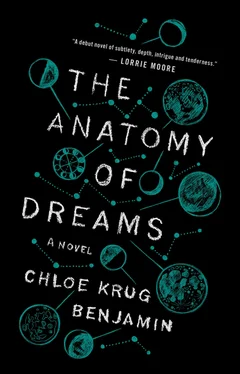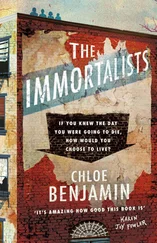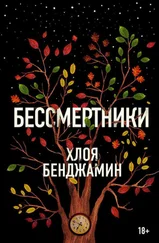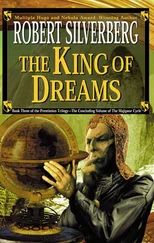“It’s different,” he said. “Poets question mysteries: they observe, they stand witness but they don’t necessarily try to solve them. What you’re doing is much more dangerous. You’re trying to put a face to the subconscious—something that should, in my opinion, remain faceless. You’re dragging it out of its cave, shining a flashlight in its eyes.”
I could tell that Thom was enjoying the debate, but after Jamie’s session, I was squirming with discomfort. I was irritated, too, for being so susceptible to doubt. It was as though I’d discovered that the elegant system of rationale I’d built around our research was actually made of cards—as though I’d seen how very little it took for it to fall apart. Why I put so much stock in Thom’s opinion, and so early, I wasn’t sure; perhaps it was that he was the only person with whom I’d shared so much about our research, and his judgment, now, was the only one I could receive. But I had too much pride to tell him any of this. I raised my eyebrows, leaned back in my chair.
“Well, good luck writing a dissertation without answering any questions.”
“Thank you,” said Thom, with no trace of irony.
“Just because we seek answers doesn’t mean we’re being invasive or turning over rocks that would be better left alone,” I said, gaining momentum. “I think your argument’s too simple. Ignorance isn’t always so noble, you know. We’re meant to ask questions—that’s what makes us human. And answers proceed naturally from questions.”
“Do they? Naturally?” he asked. I paused, and he smiled, more gently this time. “Look at us. Put two academics in a room and all they can talk about is work. Tell me something else about yourself. Do you have a hobby?”
“I used to paint,” I said. “But I haven’t in years.”
“Why not?”
“No time.”
“No?”
I shook my head, my eyes level with his. I felt exposed, plucked from my usual habitat. Here the ground was flat, without boulders to hide behind, and there was no wind to make noise of the air.
“Do you have a hobby?” I asked.
“I do,” he said. “I like to cook, and I make a damn good sandwich. Chicken salad’s my specialty, and I’ve got some fresh in the fridge I made yesterday. Would you like one?”
“A sandwich would be great,” I said. Thom stood and left.
“Anyhow,” he said, shouting from the kitchen, “I didn’t mean to push too hard on your research. I’m a poetry scholar, for God’s sake. What do I know? I’ll have to ask Janna—see how she feels about having her rocks turned over. Was she approved, by the way?”
“Approved for what?”
“For your research. She told me she stopped by your place a few days ago to ask about getting involved.”
“Are you sure?”
I’d seen Janna at our house the day before, when she and Gabe were planting trees, but he hadn’t mentioned that she’d come over before that. I remembered the remark she’d made about wanting to be hooked up to our machines. I just never imagined she’d try to go through with it.
“I’m positive,” said Thom. “This must have been about a week ago. She said she spoke with Gabe, but I assumed you were home.”
He came back into the room with a halved sandwich on a yellow plate. Each half had a generous helping of chicken salad held together with thick mayonnaise, bits of grapes and chopped-up apple visible throughout.
“Does she have any kind of sleep disorder?” I asked. I took a bite and licked the mayonnaise that spread to the side of my mouth.
“Not that I know of.”
“You’d know.”
“How?”
“Trust me.” I shoved another bite in my mouth, and two grapes plopped onto the plate. “You’d know if she was violent, if she screamed in her sleep or kicked and thrashed. You’d know if she tried to hurt you—”
“Jesus, Sylvie.” The amusement on Thom’s face was gone, and he looked uneasy. “Is that what your patients do?”
“Like I said. You’d know.”
Thom was silent as I finished the sandwich. I wiped the sides of my face with my hands and brought the plate to the kitchen. As I washed it at the sink, I noticed that the lights in the downstairs level of our house were on. It was still misty, but when I brought my face closer to the window, I could see Gabe’s shape moving from room to room. I put my plate in the drying rack and went back to the living room to tell Thom I had to leave, but the room was empty.
“Thom?”
Was he upstairs in the bathroom? I walked to the stairs and called again, but there was no reply. I decided to explain myself the next time I saw him; I was anxious to get home and ask Gabe about Janna. I was crossing through the kitchen when I heard Thom’s voice behind me.
“Going so soon?”
He stood in the doorway of the living room wall, the one that led to the basement. He held a battered, ancient book, its cover soft and green as moss.
“I wanted to show you this,” he said.
He held the book toward me. It smelled sweet and intoxicating, like rotting wood. I tensed, ready to tell him I was leaving, but something in his face made me swallow the words. In it I saw the same vulnerability, the same tentative desire to share, that I’d felt while discussing my research.
“What is it?” I asked.
“ The Poetical Works of John Keats. Original edition, 1884. I thought I’d read the rest of the poem you liked. ‘Endymion,’ it’s called. The Greeks believed he was a shepherd or an astronomer who fell in love with the goddess of the moon—some say the moon itself. But Endymion was just a man; unlike the moon, he could age and weaken and die. So the goddess cast a spell on Endymion—one that made him sleep forever, immortal. That way, they could always be together.”
“That’s incredibly depressing.”
“It’s not.” Thom tucked his chin and pulled away, as though I’d insulted him.
“It is,” I said, laughing. “The guy gives up his humanity, just to sleep for all time? I mean, granted, I haven’t met her, but I don’t get the sense that the moon makes a very good girlfriend.”
“She certainly does,” said Thom. “First of all, she’s ridiculously prompt.”
“She knows how to keep her distance,” I added.
“She’s like, four billion years old, so she’s got a shit-ton of life experience.”
“Her face is a little scarred, but hey, whose isn’t?”
“According to the myth, they also had about fifty daughters.”
“Good lord,” I said. “That’s nightmarish.”
We were both laughing now, the book almost forgotten. When we became quiet again, Thom smiled, looking down at it, before putting it inside the open basement door.
“Well,” he said. “Maybe another time.”
I left through the porch, pulling the screen shut behind me. Wet grass squealed under my feet as I crossed to our house. When I stepped inside, Gabe was eating a peanut-butter sandwich over the sink.
“Hey,” he said. “What were you doing at Thom’s?”
I wondered how long he had been standing there. From the window above the sink, it was possible to see straight into Thom’s living room.
“He invited me for lunch,” I said. “You were still asleep.”
“No, I left hours ago. Keller called—said they were understaffed at the clinic and he needed me to take the place of one of the receptionists. I was going to tell you, but then I saw you on the porch, out like a light. So I left a note.”
He gestured to the counter, where there was a small slip of yellow paper.
“You should have woken me,” I said. “I could have helped.”
“But you had such a rough night. I wanted to let you sleep. Besides, I was only answering phones. I thought I was doing you a favor by letting you nap.”
Читать дальше












